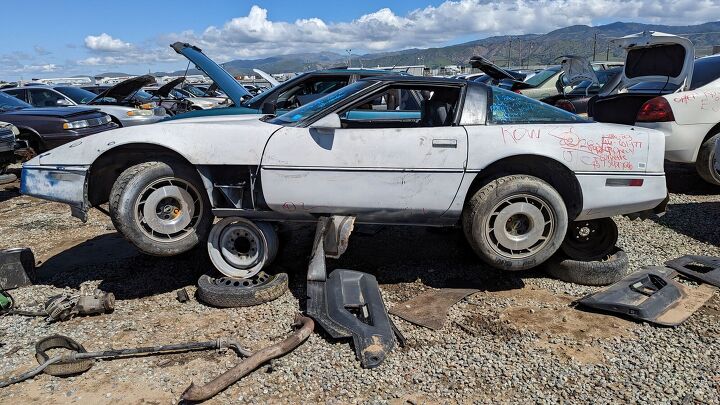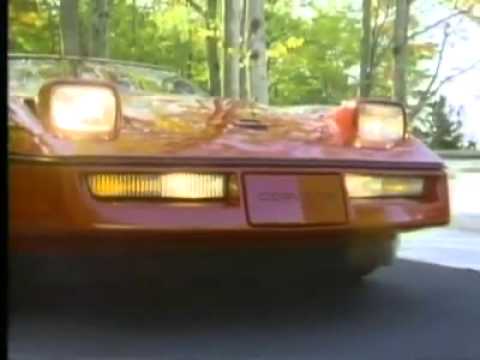Out of all the eight generations of Chevrolet Corvette production, the biggest success in the showrooms was the 1968-1982 C3. The C3 looked wild and boasted Jimi Hendrix and Joan Didion provenance, but it handled like a truck and power numbers were grim once the Malaise Era took hold. The General decided he’d be wise to make its C4 successor a cornerin’ and brakin’ machine, and today’s Junkyard Find is a first-year C4 discovered in a Northern California car graveyard last year.

For the record, the best-ever model year for Corvette sales was 1979, with 53,807 sold. The second-best year was 1984 (51,447 sold), and this one was built in June of that year.

We might consider the ’84 Corvette to be two model years in one, because ( much-debated) production delays meant that no 1983 Corvettes were sold to the public. Still, its impressive sales figures weren’t entirely due to pent-up Corvette demand after the lost year.

I graduated from the Class of 1984 at Alameda High School, and the now-defunct Chevrolet dealership a few blocks from the school made sure to pose the Hornets cheerleaders with the futuristic-looking new Corvette for use in local advertisements. There was much excitement among my gearhead peers about the C4, though the thing was well beyond the financial reach of anyone we knew at the time (and I thought the new Mitsubishi Starion looked cooler, anyway).

As it turned out, the C4 is the only Corvette generation to have become commonplace in junkyards since I came of driving age. I started seeing not-so-mangled early C4s at the Ewe Pullet-type yards as early as the middle 1990s, and they’re all over the place now. I find the occasional C3 or C5 during my junkyard travels these days, but they’ve been so crashed and/or burned as to be unrecognizable and I don’t bother photographing them.

The Malaise Era ended after 1983, according to the world’s foremost authority on the subject, but the 1984 Corvette had what amounted to a 1983 engine: a 350-cubic-inch (5.7-liter) small-block rated at 205 horsepower and 290 pound-feet. That was just five apiece more horsies and torquies than the 350 in the extremely Malaisey 1982 Corvette.

The C4 was planned all along to benefit from a thoroughly modern sports-car suspension (which it had from the beginning) and electronic fuel injection that would deliver serious power while meeting strict emissions requirements and getting decent fuel economy. That second part happened as well… but not for the 1984 model year. The first-year C4s got a kludgy dual-throttle-body system known as Cross-Fire Injection.

Cross-Fire Injection was sort of a mashup of the 1980 Computer Command Control Quadrajet system and the more modern TBI rigs used on GM cars later in the decade. The two throttle bodies look mean, but they’re only here because Rochester took too long to design and deliver a single throttle body big enough for a 350 in time.

The 1985 Corvette got a TBI system with a single throttle body and a better-flowing intake (known as Tuned Port Injection) and engine output jumped to 230 horsepower and 330 pound-feet. Fuel economy improved from the 1984 model’s 15 combined MPG to 17 combined MPG that year, too.

Two transmissions were available for the 1984 Corvette: a four-speed automatic and an interesting four-speed manual with an electronically-controlled overdrive unit known as the Doug Nash 4+3. This car has the latter type. The four-on-the-floor was considered old-fashioned by the middle 1980s, though American car shoppers could buy new cars so equipped all the way through 1996. The Corvette skipped five-speed manuals completely, introducing a six-speed for the 1989 model year.

This junkyard is located just about 25 miles up the Pacific coast from Laguna Seca. It appears that this Corvette has been crushed by now, but Pick-n-Pull’s inventory shows five C4s at their other nearby locations.

The C4 stayed in production through 1996, with just over 350,000 built.

This promotional film seems like a throwback to the 1970s, which weren’t too far back in the rear-view mirror.

Early C4 advertisements seemed less exciting than those for, say, the Cavalier Z24. Presumably, the car sold itself.

The Chevrolet Division should have hired the agency that did Toyota’s JDM Corona GT TV commercials, then ordered the sound of roaring engines and screeching tires turned up to 11.

1984 Chevrolet Corvette in California junkyard.

1984 Chevrolet Corvette in California junkyard.

1984 Chevrolet Corvette in California junkyard.

1984 Chevrolet Corvette in California junkyard.

1984 Chevrolet Corvette in California junkyard.

1984 Chevrolet Corvette in California junkyard.

1984 Chevrolet Corvette in California junkyard.

1984 Chevrolet Corvette in California junkyard.

1984 Chevrolet Corvette in California junkyard.

1984 Chevrolet Corvette in California junkyard.
[Images: The Author]
Become a TTAC insider. Get the latest news, features, TTAC takes, and everything else that gets to the truth about cars first by subscribing to our newsletter.

